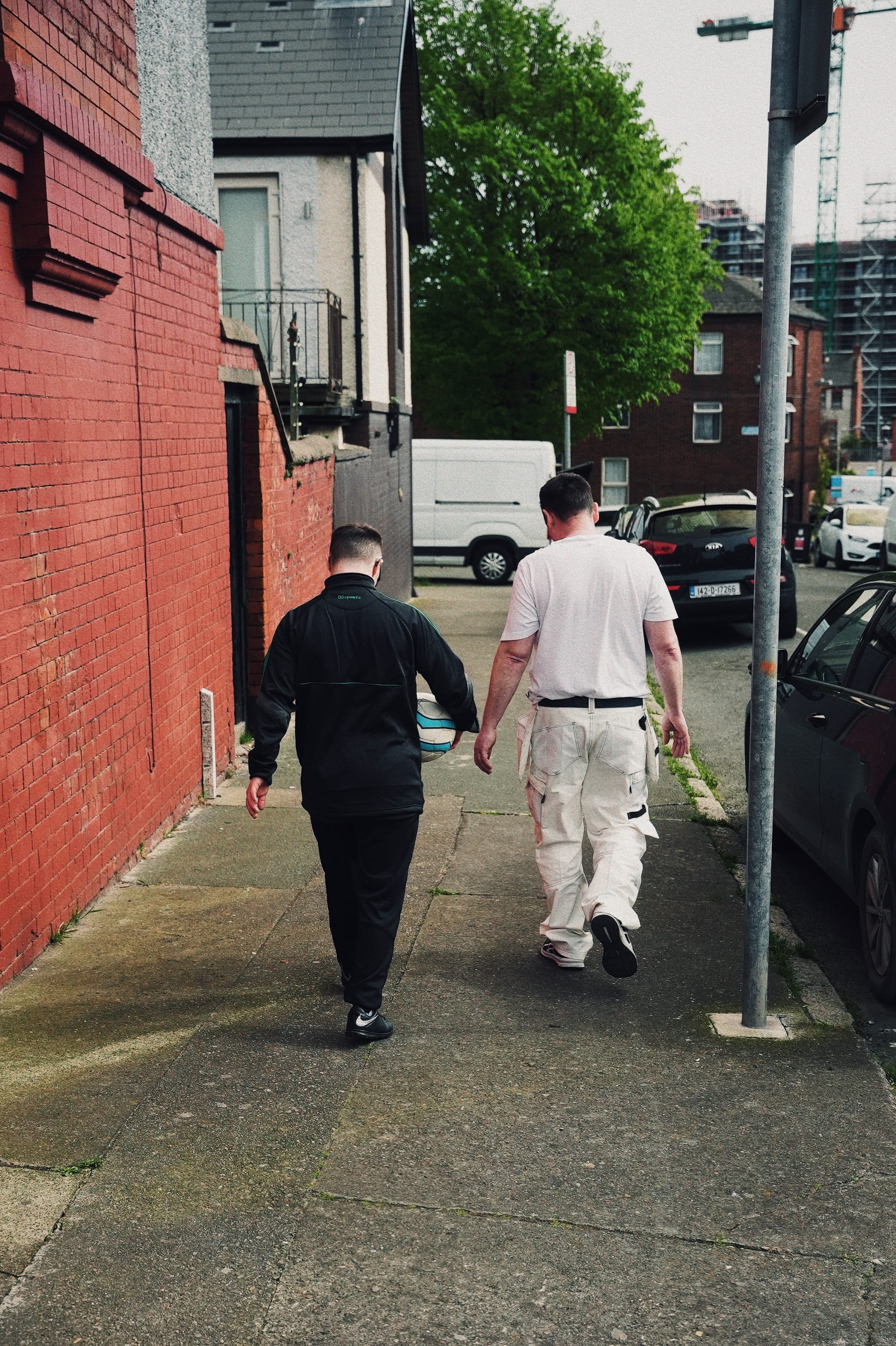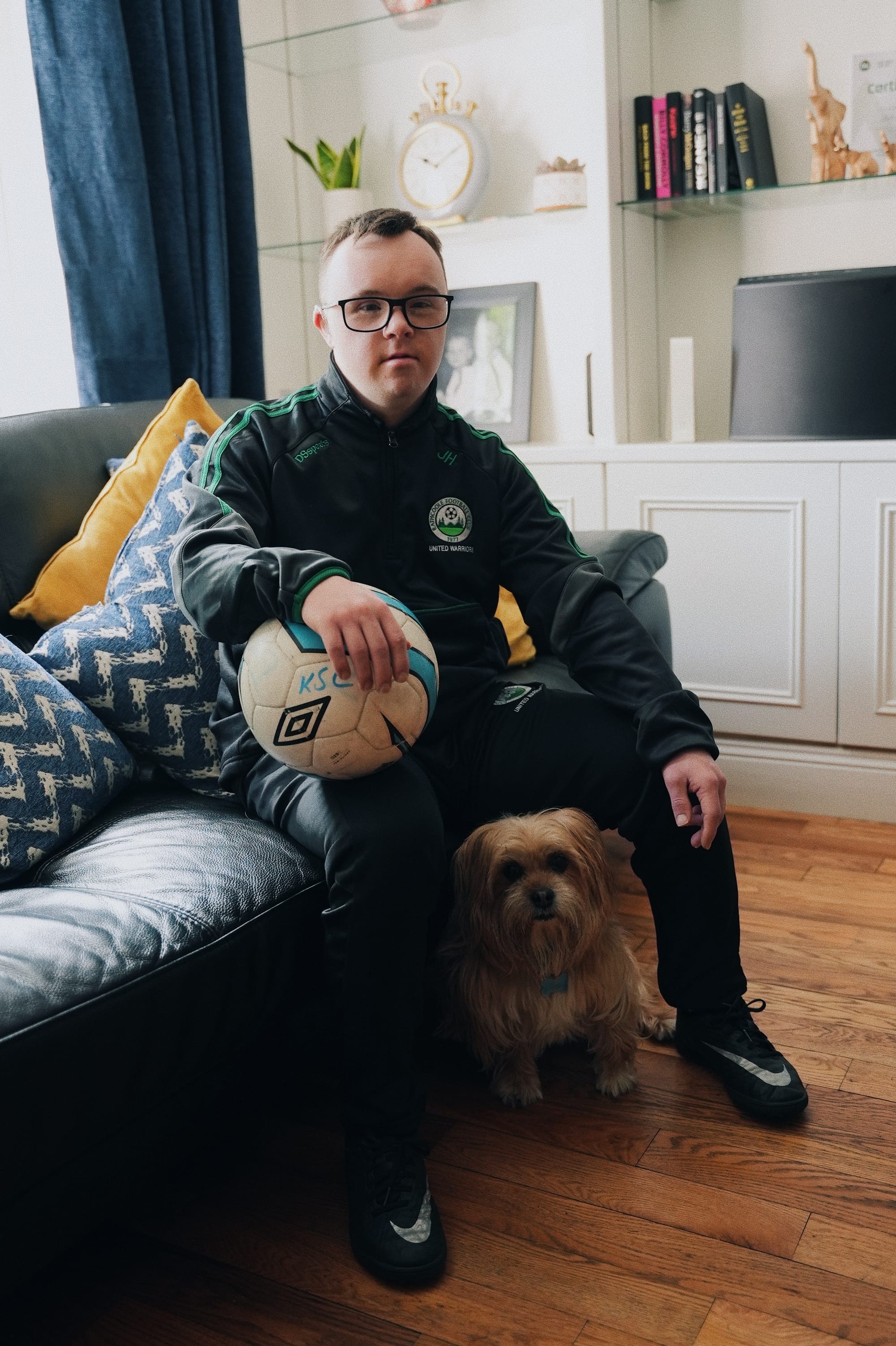What’s the best way to tell area residents about plans for a new asylum shelter nearby?
The government should tell communities directly about plans for new asylum shelters, some activists and politicians say.
Josh Hennessey has been picked to play for Ireland’s Down syndrome futsal squad in a European competition in Italy in September.

It was cool and overcast when Josh Hennessey rolled up to Unit 5 Strength and Fitness in Bluebell on Thursday morning about 11 o’clock.
Blue Nike backpack, grey tracksuit, trainers on, ready to work out.
He hops out of the car and into the gym. It’s in an industrial unit, the front shutter rolled up two storeys, letting in the breeze.
The music is pumping. It’s something bouncy, full of energy. Gym music.
Hennessey strides in past the heavy bag near the entrance, a pair of gloves lying on the floor nearby. Past a bench and a rack of weights.
Mick Byrne, who owns the gym, is already working with two other young men. He has them doing stretches on the floor.
They stop and stand, one applauding as Hennessey walks in.
“Congratulations!” Byrne says, and high-fives Hennessey.
“Thanks,” says Hennessey.
“I’m buzzin for ya,” Byrne says, with a warm smile.
Over the weekend, Hennessey had learned that he’d been picked to represent Ireland as part of the country’s first international Down syndrome futsal team. They’re aiming to fly to Italy in September to compete.
“They’ll get to pull on the green jersey,” said the team’s head coach, Paul Smyth, a development officer at the Football Association of Ireland (FAI). “They’ll receive an international cap for taking part.”
In the front room of their house near Meath Street the previous day, Josh Hennessey’s father John sits on the edge of the couch, talking fast and about his son’s successes.
Josh, 25, sits across the room in a yellow wingback chair quietly, wearing a Rathcoole FC United Warriors jersey, his feet propped up on a football.
The younger Hennessey is just back from work at Café en Seine, “the posh place on Dawson Street”, John explains. Working there he’s learned to pull a pint, he says.
“And cocktails,” Josh says.
John, a painter by trade, used to play soccer himself back in the day, for St Francis FC, he says. “I played with some of the greats.”
When he and his wife Annette had Josh, John says his instinct was to wrap the boy in cotton wool and keep him close.
But Annette wasn’t having it and just pushed him out the door to go play with all the other kids, he says.
“At 10 he was playing against men, against much older lads,” John says.
Whatever Annette thought about all that, today she’s not talking. “She hates these kinds of things,” John says.
She’s making hot drinks, and minding their curly little mop of a dog, Tyson, a mutt – “a liquorice allsorts”, John says – who tends to walk up to Meath Street and beg for treats there if someone doesn’t keep an eye on him.

Out the front door on their doorstep is a gorgeous little green with two small soccer goals. Terraces of houses are wrapped around it.
Neighbours sit on chairs outside their doors, taking in the afternoon sun, watching a gaggle of kids milling around.
Futsal’s not that different from the soccer Josh has been playing forever, says Smyth, the FAI development officer.
It’s a five-a-side version, played inside, he says. It’s played with a heavy, low-bounce ball – inside pitch markings, not off the walls or anything, he says.
“It probably lends itself better to the abilities of the players,” Smyth says. “And the number of players we have.”
When Down Syndrome Ireland’s Louth Meath branch and the FAI’s Football for All programme started working to develop futsal players with Down syndrome, they held talent days all around the country, Smyth says.
In the end, they gathered together a pool of about 80 players. They hope to grow that pool over time, but at the moment it just seemed more realistic to stick to five-a-side futsal, rather than 11-a-side soccer, Smyth said.
Over several months, the organisers whittled down the pool to the final eight – enough to keep five on the pitch and have three subs.
“Josh is the only Dub,” John says.
On the phone on Friday, Smyth, the team’s head coach, says they’ll start training in May and train “right across the summer” at TU Dublin’s Blanchardstown campus.
“We’ll supply the players with individual training programmes” to work on outside of that, too – ball-control exercises, that kind of thing, he says. “Then, as well, working on their fitness levels.”
They’ll play several games over the summer against other teams to put their skills to work, Smyth says.

And there will be fundraising. The families have to pay to fly each player, and a family member, over to Padua for 3–10 September. Plus meals, accommodation, and registration fees, says Smyth.
At Unit 5 in Bluebell on Thursday morning, Josh hops on a stationary bike. The music is still pumping, the breeze blowing in from the open front of the gym.
Byrne, his trainer, leans in for a quick conference with him about how hard and how long to ride on it. And he’s off.
Josh and his family don’t know exactly what’s going to happen next with the international team, his father had said back home the day before.
But he’ll keep training, keep going to the gym, be ready for whatever comes, John says.
At the gym, Byrne, Josh’s trainer says, “He loves his training. He always puts in the work.”
“He never misses a session. If only all my other clients were like that,” Byrne says, laughing.